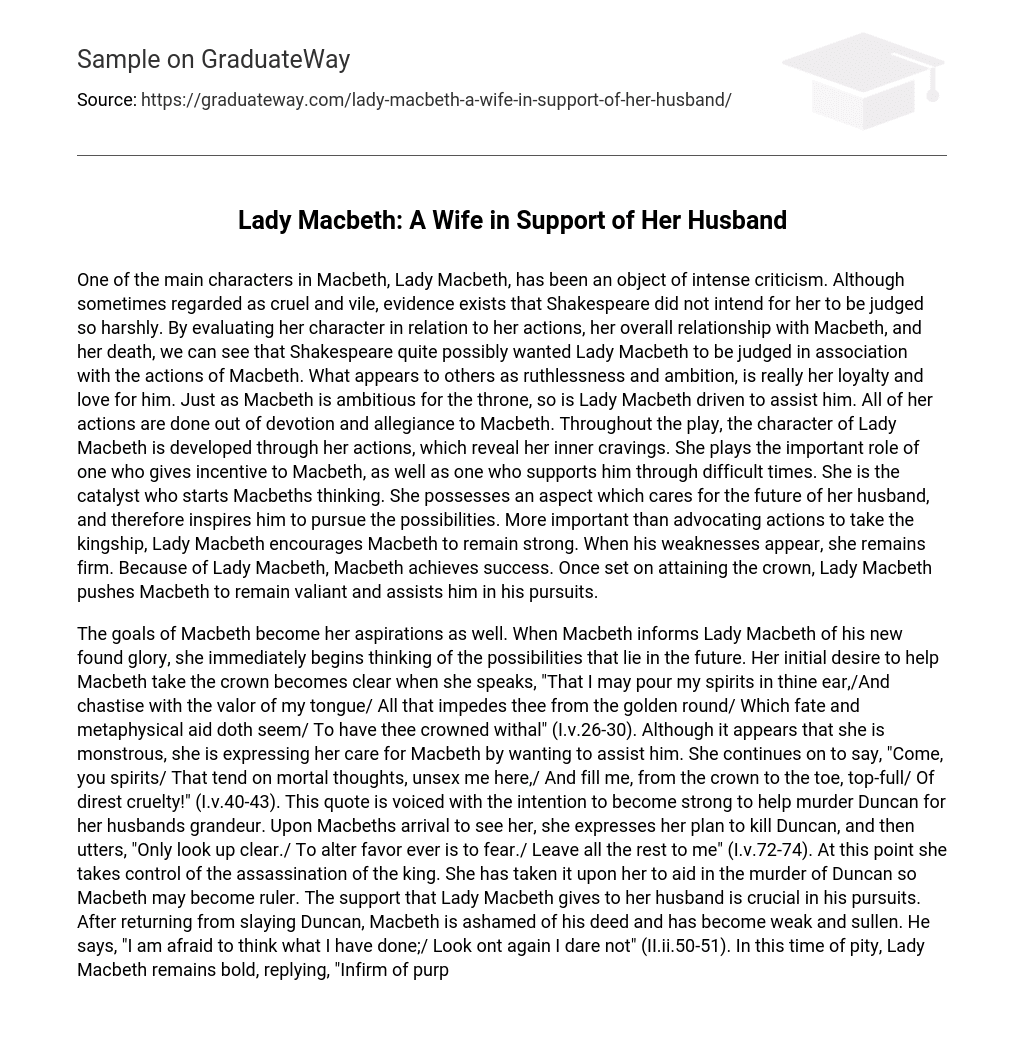Despite frequent criticism, Shakespeare did not intend for Lady Macbeth, a main character in Macbeth, to be harshly judged. Instead, her actions, relationship with Macbeth, and death should be used to evaluate her character. It is possible that Shakespeare wanted readers to judge Lady Macbeth based on Macbeth’s own actions. While some may view her behavior as cruel and ambitious, it can actually be seen as a display of loyalty and love towards Macbeth. Like Macbeth’s ambition for the throne, Lady Macbeth is driven by a desire to assist him. All of her actions stem from deep devotion and allegiance to him. Throughout the play, Lady Macbeth’s character evolves through her actions which reveal her inner desires.
Lady Macbeth plays a significant role in supporting and encouraging Macbeth, motivating him to pursue opportunities and deeply caring for his future. She remains unwavering when Macbeth’s weaknesses emerge, providing steadfast support. Lady Macbeth’s influence aids in Macbeth’s achievement of success. As he becomes resolute in his pursuit of kingship, she urges him to maintain strength and assists him in his endeavors. Lady Macbeth shares his ambitions and eagerly contemplates the possibilities that lie ahead when he reveals his newfound glory. Her initial desire to assist him in claiming the crown is evident as she states, “That I may pour my spirits into your ear,/And chastise with the power of my words/ Anything that obstructs you from attaining/ The golden circle/ That destiny and supernatural forces seem/ To have destined you to wear.”
Lady Macbeth, despite her monstrous appearance, expresses her care for Macbeth and desire to assist him by asking the spirits to unsex her and fill her with cruelty. Her goal is to help murder Duncan for the sake of her husband’s ambitions. Upon Macbeth’s arrival, she discloses her plan to kill Duncan and instructs him to leave everything to her. Lady Macbeth assumes control of the assassination and is determined to aid Macbeth in becoming ruler, playing a crucial role in his endeavors. However, after committing the act of killing Duncan, Macbeth becomes filled with shame and weakness.
He expresses his fear and reluctance to contemplate the consequences of his actions, stating, “I am afraid to think what I have done;/ Look ont again I dare not”. However, even in this compassionate moment, Lady Macbeth remains steadfast and counters, “Infirm of purpose!/ Give me the daggers. The sleeping and the dead/ Are but as pictures. Tis the eye of childhood/ That fears a painted devil”. Macbeth begins to internalize the guilt for his deeds, while Lady Macbeth feels ashamed to possess a weak and cowardly heart. She serves as a harsh and unsympathetic influencer that Macbeth requires. Recognizing his despair, she endeavors to instill him with courage, demonstrating her concern for his well-being and desire for him to remain resolute. This care she exhibits towards Macbeth disproves any notions of her being monstrous.
Not only does Lady Macbeth support her husband, but she also covers up his weaknesses. During a banquet at the palace, Macbeth’s guilty conscience overwhelms him and he has a mental breakdown. After having Banquo killed, Macbeth starts to believe that he sees the ghost of his former friend. He begins speaking to the ghost, although it is not visible to anyone else. Recognizing the danger of her husband revealing his involvement in the murders of Duncan and Banquo, Lady Macbeth makes excuses for his behavior. She tells them, “My lord is often like this, and has been since he was young. Please, stay seated. His episode is brief.” She conceals her husband’s madness and later orders the lords at the dinner to leave immediately, saying, “Don’t waste time leaving in order. Just leave.” At this critical moment when Macbeth could have exposed his connection to the previous murders, Lady Macbeth defended him and stood up for him.
Macbeth and Lady Macbeth’s relationship is characterized by their ambitious plans. Despite the absence of intimate moments between them, their interactions and words reveal the nature of their bond. In the palace, after plotting Banquo’s murder, Macbeth reflects on their past actions with regret. Lady Macbeth is present to boost his confidence, reassuring him that events beyond repair should be disregarded: “Why do you keep alone, Things without all remedy/ Should be without regard: whats done is done” (III.ii.11-12). She goes on to comfort him, urging him to improve his appearance and demeanor: “Gentle my lord, sleek oer your rugged looks;/ Be bright and jovial” (III.ii.27-28). She worries about his deteriorating mental state and consistently supports him in her attempts to help.
Understanding Lady Macbeth’s mental condition is crucial to grasp the significance of her death. Initially, she appears unyielding and insensitive, but as the play progresses, her conscience starts to overcome her. In a conversation with Lady Macbeth’s Gentlewoman, the doctor states, “Unnatural deeds breed unnatural troubles. Infected minds will discharge their secrets to their deaf pillows.” Lady Macbeth’s death is a consequence of her deteriorating mental state, which has harmful side effects. She begins sleepwalking, experiencing nightmares, and talking in her sleep. At the end of her life, a doctor examines her condition and confesses, “This disease is beyond my practice.” Lady Macbeth reaches a point of hopelessness where suicide becomes the only solution.
Lady Macbeth’s self-destruction reveals her emotional depth and remorse for her deeds. Despite being perceived as cruel and monstrous by some, this is not the intended portrayal. Lady Macbeth genuinely loves her husband Macbeth, even if her actions may appear harsh to others; ultimately, they are meant to aid him. She remains devoted and stands by his side until her death. Lady Macbeth offers encouragement and support to Macbeth in challenging times. Her suicide demonstrates both her moral compass and capacity for grief. Consequently, Lady Macbeth emerges as a compassionate spouse who wholeheartedly supports her husband’s actions.
Work Cited
- Shakespeare, William. Macbeth. Elements of Literature. Ed. Robert Anderson et al. 6 volumes. Austin: Holt, 1989. 6: 254-329.





